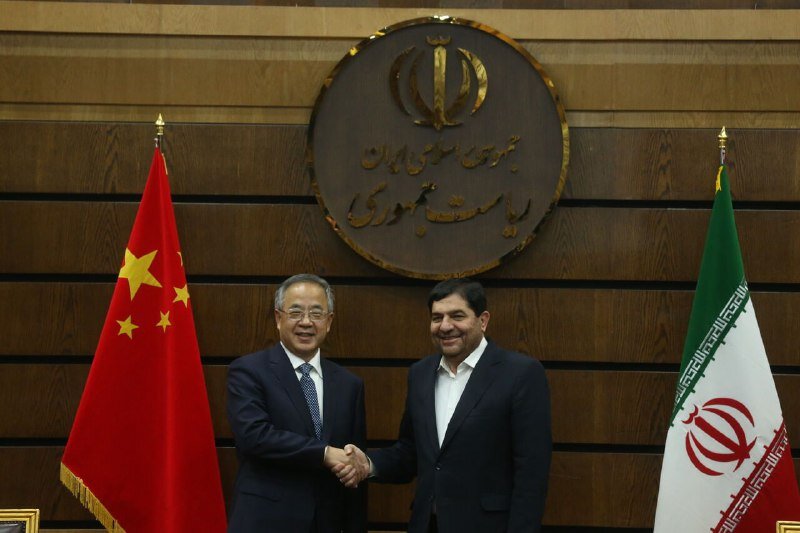China voices support for Iran’s territorial integrity

TEHRAN – A senior Chinese official who is in Tehran for talks on a long-term cooperation plan with Iran has expressed support for Iran’s territorial integrity following a controversial joint statement issued by China and Iran’s Arab neighbors.
A high-level Iranian and Chinese delegations held a meeting in Tehran on Tuesday to discuss ways to enhance the process of implementing the 25-year cooperation plan between Tehran and Beijing.
The Iranian delegation is headed by First Vice President Mohammad Mokhber while the Chinese delegation is led by Chinese Vice Premier Hu Chunhua, Iran’s state news agency IRNA reported.
In the meeting, Mokhber underlined the strength of Iran-China relations. “The relations between Tehran and Beijing have a high status for the leaders of the two countries, and the president of our country also seriously follows the bilateral relations,” Mokhber said, according to ISNA.
The first-vice president assessed the meeting between the presidents of Iran and China in Samarkand as a turning point in the relations between the two countries and thanked the Chinese president for supporting Iran's presence in organizations such as Shanghai and BRICS.
Underling Iran-China shared views toward the “domineering world,” Mokhber said good and constructive negotiations are going on between the two countries regarding various issues.
He considered preserving and respecting the territorial integrity of the Islamic Republic as a sensitive and important issue for the officials and members of the Iranian nation and considered it necessary for all countries to observe this mutual and inviolable principle.
Referring to the historical records of the relations between the two countries, the Chinese official stated in the meeting, “China's will to develop comprehensive strategic relations with Iran will never change.”
He added, “China supports the national sovereignty, territorial integrity and national honor of Iran and the fight against foreign interference. In this field, the two sides should support each other decisively and strengthen their cooperation and coordination in the field of fighting terrorism.”
Iran-China relations have undergone a fleeting sense of tension over the last few days. Chinese President Xi Jinping’s recent visit to Saudi Arabia raised eyebrows in Iran as it touched on a controversial issue of extreme importance to Iran in its relations with its southern Arab neighbors.
The leaders of the Persian Gulf Cooperation Council (GCC) states and China issued a joint statement that upset Iran.
In their joint statement, the leaders called for a “peaceful solution” to the issue of the three strategically-located islands in the Persian Gulf - Abu Musa, the Lesser Tunb, and the Greater Tunb.
“The leaders affirmed their support for all peaceful efforts, including the initiative and endeavours of the United Arab Emirates to reach a peaceful solution to the issue of the three islands; Greater Tunb, Lesser Tunb, and Abu Musa, through bilateral negotiations in accordance with the rules of international law, and to resolve this issue in accordance with international legitimacy,” the joint statement said.
Iran strongly condemned the claims to the islands, saying that they are an indispensable part of Iran’s territory. The Iranian reaction came from high diplomatic echelons.
“The three islands of Abu Musa, Greater Tunb and Lesser Tunb in the Persian Gulf are inseparable parts of Iranian soil and eternally belong to this motherland. We have no qualms about the necessity of other parties respecting Iran's territorial integrity,” Iranian Foreign Minister Hossein Amir Abdollahian said on Twitter.
Mohammad Jamshidi, the deputy chief of staff for political affairs to the Iranian president, was blunter than usual in his criticism of China. “A reminder to colleagues in Beijing. While Saudi along with the US backed ISIS/Al-Qaeda in Syria and brutalized Yemen, Iran fought terrorist groups to restore regional stability and security and to prevent the spread of insecurity toward both the East and the West,” he said on Twitter.
Also, Nasser Kanaani, spokesman for the Iranian foreign ministry, has said that Iran conveyed its “strong discontent” with the GCC-China statement.
Chinese Ambassador to Iran Chang Hua was summoned to the foreign ministry over the joint statement following the GCC-China summit in Saudi Arabia, according to Al Alam.
Hu’s visit to Iran comes after Iran and China successfully overcame the tensions. Vice Premier Hu started visits to the United Arab Emirates and Iran from Dec. 10 to 14 at the invitation of the Iranian and UAE governments.
In the UAE, Vice Premier Hu said China is ready to work with the UAE to jointly promote new progress in bilateral practical cooperation, according to Xinhua.
Hu made the remarks on Sunday during his meeting with Sheikh Mansour bin Zayed Al Nahyan, the UAE deputy prime minister and minister of presidential affairs, in Abu Dhabi.
China is ready to work with the UAE to consolidate political mutual trust, synergize their development strategies, advance high-quality Belt and Road cooperation, expand cooperation in new and renewable energy spheres on top of consolidating traditional energy cooperation, create new highlights in high-tech cooperation, and further strengthen cooperation in fighting the COVID-19 pandemic, said the Chinese vice premier, according to Xinhua.
After concluding his visit to the UAE, the Chinese official arrived in Tehran to strengthen Iran-China relations.
In Tehran, Hu has discussed in detail the Iran-China 25-year partnership plan that is expected to upgrade the two sides’ relations to a new level.
Iranian Foreign Ministry spokesperson Nasser Kanaani on Monday praised the growing China-Iran ties.
The relationship between Iran and China is blossoming because of the political will of the two nations' leaders, citing the Monday visit to Tehran by China’s vice premier as an example.
